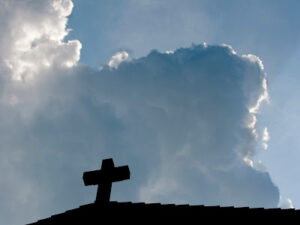![]()
![]()

To what can I compare this scene in Mark 12?
I am remembering the experience I had about 20 years ago of being examined for ordination on the floor of presbytery. It is an experience one goes into with fear and trembling. Picture this.
As you, the examinee, stands in front of the gathering, they proceed to ask their questions:
Where do you stand on eschatology? Would you say you’re a premillennialist? Postmillennialist? Amillenialist?
Are you more a Zwinglian or a Calvinist on the matter of the eucharist? Or, heaven forbid, a Lutheran???
Do your views on God’s sovereignty and human free will conform more to a Reformed or an Arminian theology?
And then one person stands up and says, “Tell us something about God’s love.” This scribe who approaches Jesus in Mark 12 is that person.
This scribe knew the answer to his question before he asked Jesus, and he was appreciative of the answer Jesus gave. Love God and love your neighbor. This, he knew, is what it’s all about. And the truth of the matter is, they all knew that love is the most important thing. It’s just that it’s all too easy to forget the most important things.
As we finished Chapter 10 last week, I said we were right at the critical point in Jesus’ journey, where everything was about to change. They were about to enter Jerusalem, and now they are there.
And he has been assaulted with test questions, trip-you-up-and-haul-you-in-for-further-questioning questions. The authorities want to do their job and they think this is doing their job. But it seems like in their overwhelming concern for getting the details just right, they have lost sight of the “why” and even the “who.”
In the middle of all this, a certain scribe draws near to Jesus, and asks him a question that gets at the essence of everything. Among all God’s commandments, what is really the important thing? They actually have a conversation that really matters, just the two of them, while, presumably, argument continues all around them. Then Jesus leans in close to this scribe and says to him, “You are not far from the kingdom of God.”
And for each of us, in our heart of hearts, this is what we want to hear. “You are not far from the kingdom of God.” Because as followers of Jesus, this is what we call home. And we deeply long for it.
The apostle Paul wrote to the church at Philippi, “We are citizens of heaven, where the Lord Jesus Christ lives. He will transform the body of our humiliation, that it may be conformed to the body of his glory.”
For four weeks now we have been talking about our identity – the who of it all, who we are in Christ. Over this time, we have looked at a few qualities of the identity we take on as Christians: we are first of all, forgiven. And as those who are forgiven, we practice forgiveness toward others – the two are inseparable. Secondly, we are friends. Jesus said there is no greater love that to lay down your life for your friends. And when we open ourselves completely to one another, in solidarity and compassion, we are laying down our lives for our friends.
A third quality is this: Jesus calls us to be salt and light for the world; to have a transformational impact on all around us.
In all these things we have the opportunity to radically change the world for good. Simply by living into our identity. And today we come to the why. Because we are citizens of heaven.
If we have been given a glimpse of the realm of God, then we know some of the ways it is different from this world we live in. Rather than vengeance there would be forgiveness. Rather than hatred there would be friendship. Rather than each of us retreating to our caves and turning our backs on the needs of the world, each of us would be salt and light in the world. We know that this is God’s desire for all of us – wholeness, shalom.
And we know that our souls long to be there.
We are all seeking, longing, aching to be not far from the kingdom of God. And so we practice this great commandment of love – to love the Lord with all of our being, and to love our neighbors as ourselves. And so in doing this we draw near to the kingdom of God.
Today we observe All Saints’ Day. We remember those servants of the Lord who have gone before us, particularly those who have died in this past year. It is, at the same time, a day of sadness and a day of thankfulness. Because when we remember these saints, we recognize all the ways they brought more love to the world. We remember how they walked in Christ’s way and practiced living out the greatest commandments.
We are thankful that they served as models of faith for us. These are the ones who taught us how to be faithful disciples, how to practice compassion and mercy and forgiveness. How to be a true friend. Because they lived, the world is not the same as it was before.
But we know, as well, that these saints also had models of faith who came before them, ones who taught them to walk this way in their time. Because this is not something one does alone. We are all a part of the great communion of the saints, the whole family of God, living and dead.
Let us give thanks for the identity that was bestowed on us in our baptism.
Let us give thanks for all the saints who have walked before us, showing us the way.
Let us live our lives always remembering the most important thing. Love. Let your decisions be made according to love of neighbor.
Photo: ChurchArt.Com
